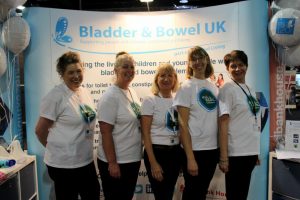This post has been written by Davina Richardson, Children’s Specialist Nurse at Bladder & Bowel UK for World Continence Week.
Bladder and bowel problems among adults are not uncommon, affecting both males and females of all ages. Some common bladder problems may include bladder leakage (incontinence), bedwetting or difficulties emptying the bladder. Some common bowel problems may include leakage (faecal incontinence), constipation and difficulties emptying the bowel.
Having a bladder or bowel problem (or both), can cause embarrassment, anxiety and distress, often having a major impact on an individual’s quality of life. Often people are reluctant to discuss their symptoms with anyone. But it’s important to know that much can be done to treat, manage and improve symptoms. It’s important to discuss any problems with local healthcare professionals to ease the taboo around this subject. World Continence Week 2018 gives everyone an insight into seeking help, talking more openly about problems and raising the profile of services that can help.
Experiencing bladder and bowel problems can affect an individual in many ways including social, psychological and financial. Many feel that they can’t take part in hobbies and sport any longer. Some people will avoid social occasions due to self esteem issues and embarrassment.
Advice, support, and practical help
Here at Bladder & Bowel UK, we can offer advice, support and practical help to individuals who are experiencing problems alongside their families, carers and healthcare professionals. Advice is available from adult and child Specialist Nurses.
There are several types of urinary incontinence. But the most common types include stress incontinence, (leaking on coughing, exercise or sneezing), urgency or dashing to the toilet, urge incontinence, mixed incontinence, overflow incontinence, difficulties emptying the bladder and functional incontinence.
Other bladder problems that do not involve leakage can include the need to pass urine frequently, urgently and an increase need to pass urine during the night.
Bladder & bowel problems in childhood and young people
Bladder and bowel problems in childhood and young people are very common. Problems including difficulties with toilet training, wetting, constipation and/or soiling affect up to 28% of all children and adolescents at any one time. Younger children are affected more often than older children. But problems can happen at any age. Parents or carers often feel as if their child is the only one suffering, as nobody talks about it.
We can also suggest how to approach your child’s GP, health visitor, school nurse, or other healthcare professional for treatment if appropriate. They should be able to offer individual assessment and treatment or refer you to a specialist for this, if necessary.
Bladder problems affect children and young people of all ages. The commonest problem is night time wetting. However, children and adolescents can also be affected by wetting during the day, having to rush to get to the toilet (urgency), or having to go to the toilet more often than is normal (frequency) or a combination of any or all of these. Less common problems include urinary tract infections (UTI).
Initially it can be difficult to understand why a child or young person has a problem with their bladder and sometimes parents or carers might think it is a behavioural problem, or that their child is being lazy.
Most children are dry in the day by the time they are three-years-old and at night by the time they are five. If a child has additional needs, it may be thought any delays in achieving dryness are related to the disability. However, all children with daytime wetting, frequency, urgency or any bladder difficulty should be offered an assessment and treatment if appropriate.

How can Bladder & Bowel UK help?
Helpline services including signposting to local specialist services, product advice, generic clinical advice and support.
How can we be contacted?
The helpline is available Monday to Friday, 9.00am – 4.00pm on 0161 214 4591. We are also contactable by email: bbuk@disabledliving.co.uk.
So, who contacts us?
Anyone concerned by a bladder or bowel problem may contact us for help and advice. This includes the general public, relatives, carers, health and social care professionals and other groups such as teachers or organisations such as charities and support groups.
Duration of calls we receive?
We receive a large number of calls each day to both the helpline or via our email service. Enquiries range from a quick question being answered. But more often are more detailed, requiring us to dedicate time with the caller, to go through their concerns or query.
Why do people contact us?
We are contacted for a number of reasons. Some request information on continence products, aids and appliances. Some are looking for local bladder and bowel services and are surprised when we inform them that things can be done to treat, improve or better manage their situation. We always try to suggest that people present for continence assessment and to signpost or put people in touch with their local services, so they can access the help they need locally. We may also signpost to other charities or organisations. Health and social care professionals may be looking for information or training, which we also provide.
We always try to ensure that people accessing our services are informed and directed to other appropriate services, such as NHS specialist bladder and bowel services for further help.
We always encourage an individual or family member to speak to someone, GP, Continence Specialist Nurse, District Nurse or other healthcare professional.



Comments are closed